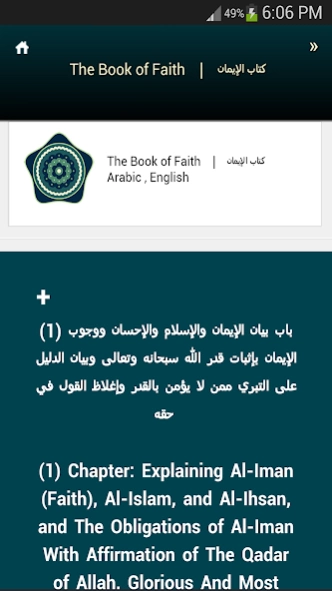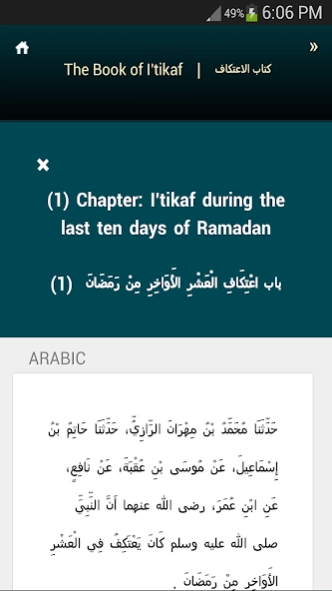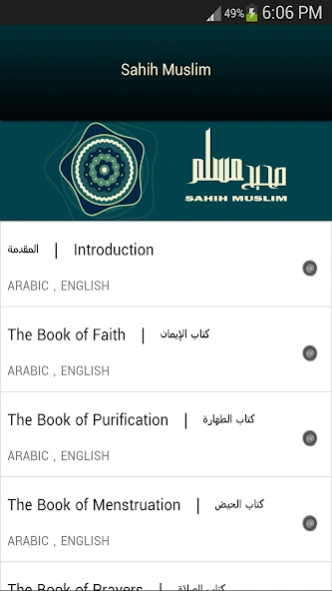Sahih Muslim 2.1
Free Version
Publisher Description
Sahih Muslim - Ṣaḥīḥ Muslim is a collection of hadīth compiled by Imām Muslim ibn al-Hajjāj
Ṣaḥīḥ Muslim is a collection of hadīth compiled by Imām Muslim ibn al-Hajjāj al-Naysāburi(rahimahullāh). His collection is considered to be one of the most authentic collections of the Sunnah of the Prophet (), and along with Ṣaḥīḥ al-Bukhārī forms the "Sahihain," or the "Two Sahihs." It contains roughly 7500 hadīth (with repetitions) in 57 books.
Author bio:
Imām Muslim's full name is Abu al-Husayn Muslim ibn al-Hajjāj ibn Muslim ibn Warat al-Qushayri al- Naysaburi (206-261 AH/821-875 AD). Imām "Muslim," as his nasba shows, belonged to the Qushayr tribe of the Arabs, an offshoot of the great clan of Rabi'a.
He was born in Naysabur (Nishapur) in 206/821. His parents were righteous people who left such an indelible impression on his mind that he spent his life as a God-fearing person and always adhered to the path of righteousness. Imām Muslim travelled widely to collect hadith in Arabia, Egypt, Syria and Iraq, where he attended the lectures of some of the prominent Muhadith of his time: Isḥāq b. Rāḥawayh, Aḥmad b. Hanbal, 'Ubaydullah al-Qawariri, Qutaiba bin Sa’id, 'Abdullah ibn Maslama, Harmalah bin Yahya, and others. After completing his education, he settled down at Nishapur. There he came into contact with Imām al-Bukhārī. Imām Muslim was impressed with Imām al-Bukhārī's knowledge that he kept himself attached to him up to the end of his life. Another muhaddith that influenced Imam Muslim was Muhammad ibn Yahya al-Dhuhali and he attended his lectures regularly, but when the difference of opinion between Muhammad b. Yahya and Imam Bukhari on the issue of the creation of the Holy Qur'an sharpened into hostility, Imam Muslim sided with Imam Bukhari and abandoned Muhammad b. Yahya altogether. He was therefore a true disciple of Imām al-Bukhārī.
He wrote many books and treatises on Hadith, but the most important of his works is the collection (Jami’) of his Sahih. He originally named his book Musnad as-Ṣaḥīḥ, and mentioned in his book that he wrote authored such a book in response to a question from one of his students.
Imām Muslim meticulously collected 300,000 hadith and after a thorough examination of them retained only 4000, the genuineness of which were fully established. He prefixed to his compilation a very illuminating introduction, in which he specified some of the principles in which he had followed in the choice of his material. Imam Muslim has to his credit many other valuable contributions to different branches of Hadith literature, and most of them retain their eminence even to the present day. Amongst these Kitab al-Musnad al-Kabir 'Ala al-Rijal, Jami' Kabir, Kitab, al-Asma' wa'l-Kuna, Kitab al-Ilal, Kitab al- Wijdan are very important.
Methods of Classification and Annotation:
Imam Muslim strictly observed many principles of the science of Hadith, which had been slightly ignored by his great teacher Imam Bukhari (may Allah have mercy on both of them).
Imam Muslim considered only such traditions to be genuine and authentic as had been transmitted to him by an unbroken chain of reliable authorities up to the Prophet () and were in perfect harmony with what had been related by other narrators whose trustworthiness was unanimously accepted and who were free from all defects. He divided narrators and sub-narrators into 3 levels:
1. Those people who are completely authentic in their memory and character with no deficiency whatsoever. They were known to be honest and trustworthy.
2. People of slightly lesser memory and perfection than the previous category, yet still trustworthy and knowledgeable, not liars by any measure. Examples of people in this category include `Ata ibn Said and Layth ibn Abi Sulaim.
3. People whose honesty was a subject of dispute or even discussion. Imam Muslim did not concern himself with such people. Examples in this category include Abdullah ibn Maswar and Muhammad ibn Said al-Maslub.
http://afrogfx.com/Appspoilcy/com.MuslimRefliction.SahihMuslim-privacy_policy.html
About Sahih Muslim
Sahih Muslim is a free app for Android published in the Teaching & Training Tools list of apps, part of Education.
The company that develops Sahih Muslim is muslim reflections. The latest version released by its developer is 2.1.
To install Sahih Muslim on your Android device, just click the green Continue To App button above to start the installation process. The app is listed on our website since 2023-04-29 and was downloaded 2 times. We have already checked if the download link is safe, however for your own protection we recommend that you scan the downloaded app with your antivirus. Your antivirus may detect the Sahih Muslim as malware as malware if the download link to com.MuslimRefliction.SahihMuslim is broken.
How to install Sahih Muslim on your Android device:
- Click on the Continue To App button on our website. This will redirect you to Google Play.
- Once the Sahih Muslim is shown in the Google Play listing of your Android device, you can start its download and installation. Tap on the Install button located below the search bar and to the right of the app icon.
- A pop-up window with the permissions required by Sahih Muslim will be shown. Click on Accept to continue the process.
- Sahih Muslim will be downloaded onto your device, displaying a progress. Once the download completes, the installation will start and you'll get a notification after the installation is finished.



